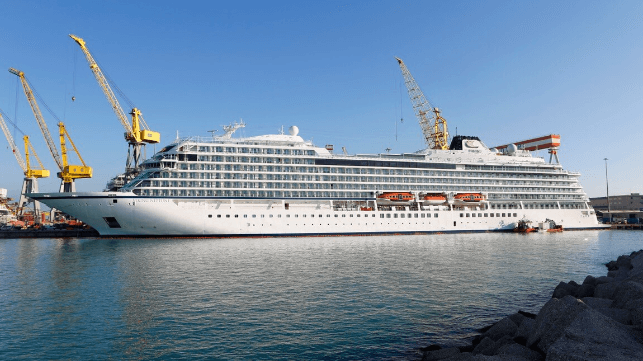Fincantieri Delivers First Viking Cruise Ship With Hydrogen Fuel Cell

The cruise industry is taking its first tentative steps toward the use of hydrogen fuel cells as the next generation of power. Both MSC and Viking are claiming firsts in the installation of the technologies as prototype systems aboard their latest cruise ships. Fincantieri, which built the cruise ship for Viking points out that it is particularly important not only for the development of the technology but also for the rules and regulations on the use of hydrogen on board a cruise ship.
Fincantieri completed the delivery today, November 10, of the Viking Neptune, the ninth cruise ship built along the same design by the Italian shipyard for Viking. The company has been delivering the cruise ships since the Viking Star began the class in 2015. Each of the cruise ships is 47,842 gross tons and 749 feet long. They accommodate 930 passengers.
Viking and Fincantieri have consistently worked together to design, deliver, and operate environmentally friendly cruise vessels. According to the companies, the Viking Neptune is the next step in their collaboration becoming the first cruise ship they have equipped with a small hydrogen fuel system for on board power. They will use the small system as a test to determine how hydrogen fuel could be developed at a larger scale in future newbuilds.
Fincantieri reports that the experimental hydrogen fuel cell module provides a nominal power of 100 kW. The cells are low temperature PEM-type fueled with hydrogen gas and room air.
The companies said they have accelerated their R&D with the aim of developing large-scale hydrogen-related applications. As a first step, the two companies designed an enlarged ship configuration that will be used on the vessels to be delivered after 2024. They are defining spaces and arrangements to accommodate larger hydrogen tanks, fuel cell systems, and related auxiliary systems. The second step will be the development of a hydrogen generation system with a total power of approximately six to seven MW. Fincantieri believes it will be the largest size ever tested on board a cruise ship.
The introduction of the fuel cell system aboard the Viking Neptune follows the MSC World Europa which was delivered in October by its builders Chantiers de l’Atlantique fitted with a small prototype solid oxide fuel cell (SOFC) system. It is based on technology from Bloom Energy and produces electricity generated by the electrochemical reactions with the LNG. The two modules each can produce up to 75kW. MSC calls the system a testbed to develop fuel cell technology to enable hybrid propulsion.

that matters most
Get the latest maritime news delivered to your inbox daily.
Working with Fincantieri, both MSC and Viking are moving toward cruise ships that will have larger fuel cell systems. MSC ordered two cruise ships from Fincantieri for its new luxury Explora Journey brand due for delivery in 2027 and 2028 with a six-megawatt fuel cell system as well as a containment system for liquid hydrogen aboard the cruise ships. The hydrogen fuel cells will be designed to produce power for the hotel operation and will run the vessels while in port without the LNG-fueled engines.
In September 2022, Viking exercised options for additional cruise ships to be built by Fincantieri. They plan to build four cruise ships for delivery between 2026 and 2028 that will also be designed for hydrogen fuel cells.
